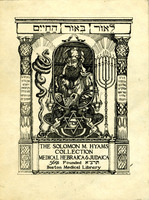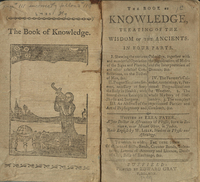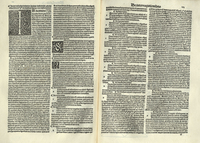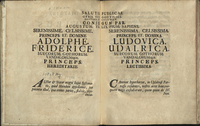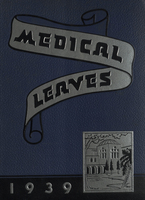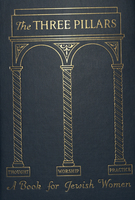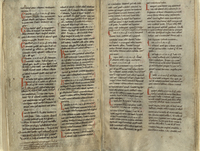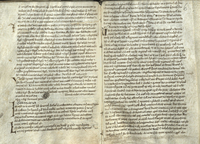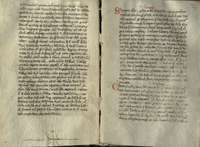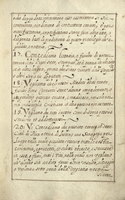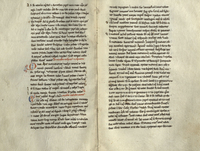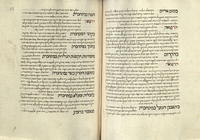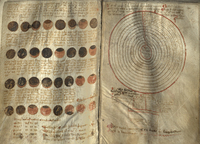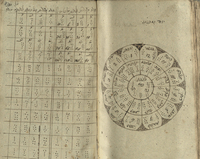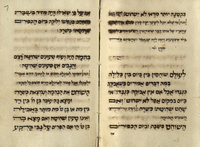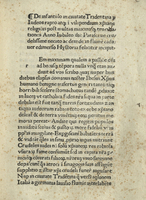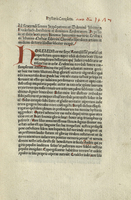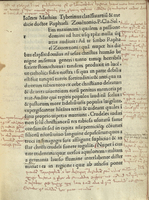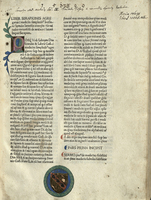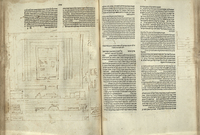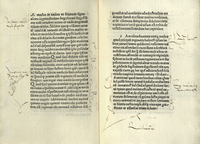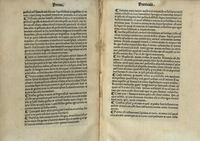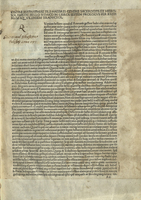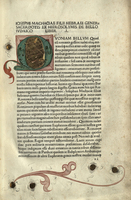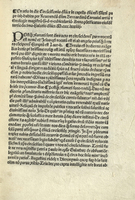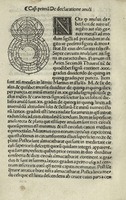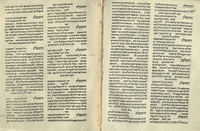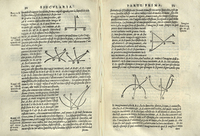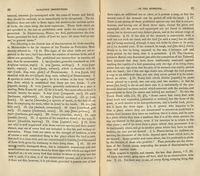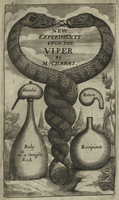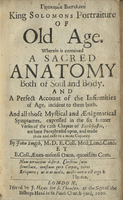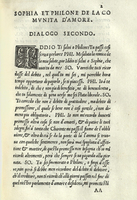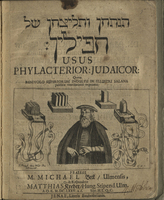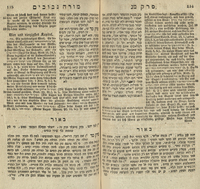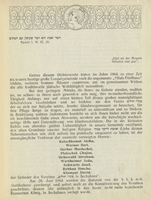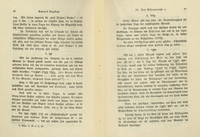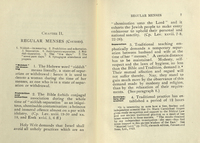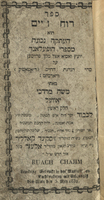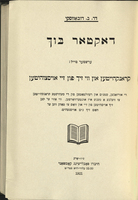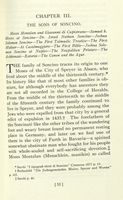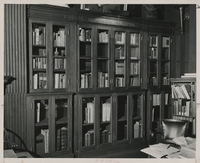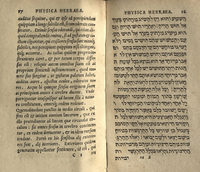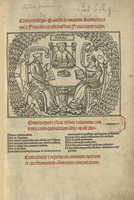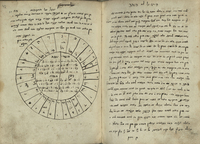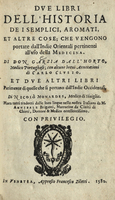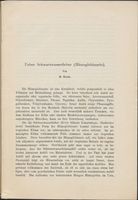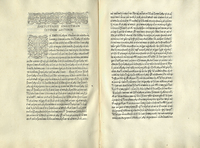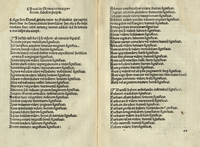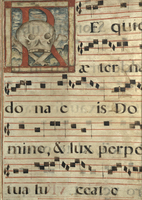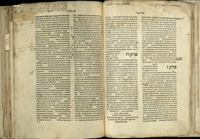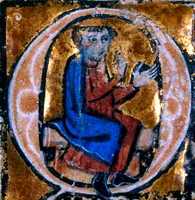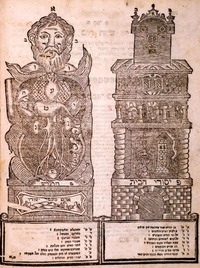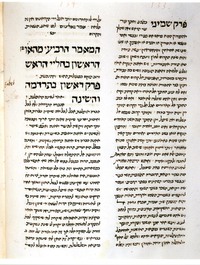Browse Items (53 total)
- Tags: Hyams Collection
Sort by:
The book of knowledge, treating of the wisdom of the ancients in four parts
Editions of The book of knowledge, a popular astrological and medical work, begin to appear in the 1530s and were printed regularly in England and America into the early 19th century. Although described on the title-page as “a Jew, Doctor in…
Tetrabiblos (Quadripartite)
The Tetrabiblos examines the influence of the stars on human affairs.
Diatriba de Avibus Esu Licitis
The author elucidates the sections of Leviticus and Deuteronomy concerning the Mosaic laws of kashrut, specifically those pertaining to birds. Norrelius was the librarian of the Royal Academy, and his learning is evident in these pages: he attests…
Medical leaves
"Medical leaves is dedicated to a study of Jewish medical history and contemporary Jewish medical problems …One of the most pressing problems confronting the Jewish physicians in this country today is that of medical Jewish refugees ……
The three pillars: thought, worship and practice for the Jewish woman
"This book is a brief exposition of those aspects of Jewish life which have special significance for the woman … it focuses the attention only on those fundamentals with which every modern Jewish woman should be familiar." – Preface.…
De Urinis
This manuscript version of Isaac Israeli’s treatise on urine is part of a larger compilation of texts which was probably used by a German medical student (the binding is typical of German craftsmanship and materials). The lack of embellishment…
Kitab al-Maliki
This work is also attributed to Haly Abbas. Also included in this volume are Constantine the African’s De Stomacho (On Diseases of the Stomach) and Marbode’s De Lapidibus (On Stones). This volume is bound in a vellum leaf of manuscript,…
A Tutti Voi Mercanti
This document bestows legal, religious, and commercial privileges on foreign merchants and the Jewish community in the cities of Pisa and Livorno. Section 18, on the right hand page, grants Jews the right to practice medicine, and section 20 grants…
Viaticum
The Viaticumis a systematic and detailed medical handbook originally written in Arabic and translated at least 3 times into Hebrew. Its popularity in medieval Europe is well-documented. The Latin translation on view here is almost certainly the work…
Lilium Medicinae; De Phlebotomia
Bernard de Gordon taught in the medical faculty at Montpellier, which was a refuge for Jewish students from Spain. The Lilium Medicinae, written in 1303 and first printed in Naples in 1480, must have been well-known and well-used, as there were 7…
Astronomica
This is a collection of 38 treatises on astronomy, astrology, and mathematics, including one of León Hebreo, (De coniunctione Saturni et Iovis anni Christi 1345 (On the conjunction of Saturn and Jupiter in the year of our Lord 1345).
Sefer Goralot
A treatise on Kabbalah, astrology and fortunetelling with elaborate diagrams of the zodiac. Ibn Ezra was an earnest apologist for astrology and translated many astrological treatises from Arabic into Hebrew. Maimonides, using Biblical law as a guide,…
Hilkhot Shehitah
Karo was a renowned codifier of rabbinical Judaism. This text specifies conditions for the kosher slaughtering of animals, including the dimensions and sharpness of the knives to be used.
Relatio de Simone Puero Tridentino (Bartholomaeus Guldinbeck, 1475)
The story of Simon of Trent is among the most egregious examples of the “blood libel” against Jews. This accusation usually involves the sacrificial killing of children whose blood is then used in various rituals, among them the making of…
Relatio de Simone puero Tridentino (Albrecht Kunne, 1476)
The story of Simon of Trent is among the most egregious examples of the “blood libel” against Jews. This accusation usually involves the sacrificial killing of children whose blood is then used in various rituals, among them the making of…
Relatio de Simone Puero Tridentino (Gabriele di Pietro, 1475)
The story of Simon of Trent is among the most egregious examples of the “blood libel” against Jews. This accusation usually involves the sacrificial killing of children whose blood is then used in various rituals, among them the making of…
Liber Aggregatus in Medicinis Simplicibus
This is the first medical book – an Arabic work on medicine, pharmacology, and therapeutics – translated by a Jew (Abraham of Tortosa, fl. 13th century). “Simples” are the foundations (plant, animal, or mineral) upon which…
Mishnah (compendium of Jewish Oral Law) with commentary of Maimonides
Maimonides composed his Judeo-Arabic commentary on the Mishnah (known in Arabic as Kitab al-Siraj; in Hebrew, Sefer ha Ma’or) between 1145 and 1168. The Mishnah, compiled in the 2nd century CE by Judah ha-Nasi, is divided into six main sections…
De Regimine Sanitatis ad Soldanum Babyloniae
This is an early work on hygiene and longevity addressed to the Egyptian Sultan Saladin; Maimonides served as physician to the vizier of Saladin. Maimonides offers advice on such subjects as diet in health and disease, common illnesses, and…
Aphorismi Secundum Doctrinam Galeni
This volume, the first printed edition of Maimonides’ interpretation of Hippocratic and Galenic doctrine, also includes the Aphorismi of St. John of Damascus, Razi’s De Secretis in Medicina, and Hippocrates’ Prognostica. Maimonides,…
Opera
This edition of Josephus' entire oeuvre includes the Contra Apionem, an apologetic work on behalf of Judaism. This copy, unrubricated save for the occasional crudely drawn initial, stands in stark contrast to the copy of De Antiquitate Judaica.
De Antiquitate Judaica; De Bello Judaico
Josephus, born in Jerusalem, had a multifaceted career as priest, soldier, and historian. His retelling of Jewish history and partially first-hand account of the rebellion against the Romans (66-70 CE), originally written in Aramaic (now lost) and…
Oratio in Die Circumcisionis Anno 1484 Habita
This sermon on Christ’s circumcision, given before Pope Sixtus IV in 1484, explores the symbolic aspects of the ritual and compares it to Christ’s eventual suffering on the cross. Carvajal claims that the process of circumcision and its…
Anulus astronomicus
Bonet de Lates was a Provençal physician and astrologer who settled in Rome, where, in addition to acting as physician to Popes Alexander VI and Leo X, he served the Jewish community as a rabbi. He is best known for his invention of the…
Perush 'al ha-Torah
This volume is a commentary on the Pentateuch (the first five books of the Hebrew Bible). Only 6 books are known to have been printed by Conat, who introduced Hebrew printing in Mantua in 1474. Conat's wife Estellina was the first woman to become…
Compendiosa Introduttione alla Prima Parte della Specularia
The Jewish community at Ferrara was one of the largest and most active in Italy; it grew rapidly during the 15th century in part because of substantial immigration from less congenial parts of Europe. The Jewish presence dwindled during and after the…
The Sanatory Institutions of the Hebrews
Abraham de Sola was born in London and became rabbi of the Spanish and Portuguese congregation in Montreal in 1846 at the age of 22. In 1849, when a religious furor arose over the use of obstetrical anesthesia, he was asked to interpret Genesis 3:16,…
New Experiments Upon Vipers
Charas trained as a classicist and pharmacist in France; his interests lay in a curious mix of therapeutics, toxicology and natural history. This volume focuses on the anatomy, physiology, and habits of snakes. Charas believed that venom was…
Gerokomia Basilike
Smith's paraphrase and exegesis of the text of Ecclesiastes 12:1-6 is noteworthy for its claim that "Solomon perfectly knew, and as plainly as his Figurative Method would give leave, described the Circular Motion of the Bloud, the best and most…
Dialogi d'Amore
León Hebreo was a Portuguese poet, physician, and philosopher who eventually settled in Venice. The Dialogi are Neoplatonic reflections on the nature and philosophy of love; this is the first edition, published posthumously.
Hanahatan va-Halitsatan Shel Tefilin
A thesis, delivered and defended publicly, on the laws surrounding the use of phylacteries, or tefillin.
Deuteronomy 6:5-8: "And you shall love the Lord your God with all your heart, with all your soul, and with all your might. Take to heart these…
Doctor Perplexorum
Maimonides' philosophical treatise on Judaism takes a rationalist perspective while embracing the Jewish mystical tradition, albeit in a limited way. The first of the 3 books examines the attributes of God and rejects the trend toward…
Gedenkbuch "Chewra Kadischa"
This volume commemorates the Hevra Kaddisha, or Jewish burial society, in several districts of Vienna during the years 1864-1905.
The Hevra Kaddisha performs an invaluable service to the Jewish community. It is charged with ensuring that the dead…
Rebecca oder das Judische Weib
More on the duties of Jewish women. These pages list the holidays and fast days in the months of Av, Elul, and Tishrei. Tisha b'Av (the ninth of Av) commemorates the two occasions on which the Temple was destroyed (587 BCE and 70 CE). Elul is a month…
Ha-likhot Betah
This volume is concerned with the laws of niddah, or separation during menstruation, and taharah, ritual purification following menstruation.
Ruach Chaim
"The Art of Prolonging Life" is the best known of Hufeland’s works, and is often cited as the origin of the concept of macrobiotics.
Doktor Bukh
This series, in 4 volumes, covers childbirth and childhood illnesses, hygiene, and first aid.
The Makers of Hebrew Books in Italy
The Soncino family was originally from Speyer, one of the German towns in which printing had an early impact. After a decree of expulsion in 1435, the family moved to the Italian town that lent the family its name. Soncino printed the first Hebrew…
The Solomon M. Hyams Collection in Holmes Hall, the old Boston Medical Library, 8 The Fenway, Boston
De Astrologia
Maimonides was probably the most famous Jewish physician of all time but known also as a philosopher, theologian, and astronomer. The De Astrologia, his letter to the rabbis of Marseilles condemning astrology, was composed in 1194; this is the first…
Opera Omnia Ysaac
This first printed edition of the collected works of Isaac Israeli includes the tract on fevers. The title-page woodcut depicts an impossible meeting of Isaac with his eleventh century commentators Constantine the African and Ibn Abi al-Rijal.
Sefer ‘Evronot
Calendar- and almanac-making manuals were commonly used to calculate the solar and lunar Jewish calendar. In the fourth century CE, a fixed calendar was established based on astronomical and mathematical calculations. This calendar is still used, and…
Coloquios dos Simples, e Drogas he Cousas Medicinais da India
Once physician to the King of Portugal, Garcia de Orta travelled to India in order to escape the Inquisition, and remained there the rest of his life. He taught in the faculty of medicine at Lisbon in the early 1530's; in 1534, he settled in Goa,…
Ueber Schwarzwasserfieber
The Hyams Collection includes the Hand-apparat, an extensive working pamphlet collection of August von Wassermann (1866-1925), a German bacteriologist who worked with Robert Koch and discovered the Wassermann test for syphilis. The collection focuses…
Opera of Aristotle
Volume one of the first printed edition of Aristotle’s works in Greek.
Somnia Danielis
The Somnia Danielis [“Daniel’s Dreams”] is a work on the interpretation of dreams; it originated in the eighth century.
Cantica de medicina
This lesser-known medical work of Avicenna is bound in a manuscript musical sheet with an unusual skull-and-crossbones illuminated initial.
Canon medicinae
The Canon medicinae, a compendium of medical knowledge and a guide to clinical teaching, was derived from Galenic and Hippocratic writings and infused by Avicenna with Arabic medical lore. The Canon includes detailed disquisitions on pathology,…
De Febribus
Isaac Israeli was born in Egypt and studied widely in natural history, mathematics, astronomy, and medicine. He settled in Kairwan, Tunisia, where he served as court physician to the caliph and wrote several esteemed medical and philosphical works in…
Illustration of the parts of the body as a house
Polish physician Tobias ben Moses Cohn knew nine languages and was court physician to five sultans in Adrianople. In 1724, he moved to Jerusalem. The Ma’aseh Tobiyyah [“Works of Tobias”] is an encyclopedia of theology, botany,…
A leaf from the Canon Medicinae of Avicenna
This manuscript copy of Avicenna's Canon, written by Mordechai bar Elia in a rabbinical hand, was formerly in the library of Prince Dietrichstein of Nikolsburg.

